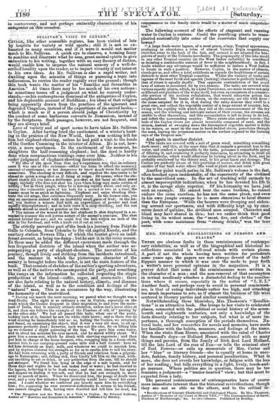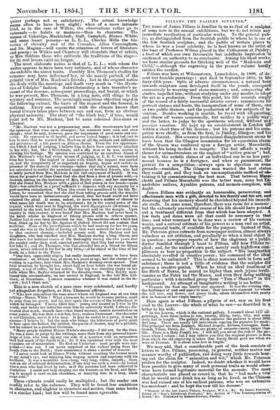MRS. THOMSON'S, RECOLLECTJOES OB l'EltdONS AND ri,AcEs.* Tii - min are obvious
faults in these reminiscences of contempo- rary celebrities,' as well as of the 'biographical and historical re- collections associated in well-read minds with certain places. A part if not the whole having been written for periodicals some years ago, the 'papers are not always devoid of the -half- flippant manner in which it was once the mode to pour forth . a :iviiter's mere personal opinions in the magazines. It is a ' graver defect that some of the reminiscences were written in the character of a man ; and the non-removal, of that assumption in sevisaL needlessly attaches a distasteful feeling to the recollec- tions where it occurs, especially in the notice of "L.E:L." Another fault,: not perhaps )casy to avoid in personal reminisben- ()es, is that of rating individuals 4athiii -too high, and at-with* too much importance to sets, 'as if' almost the business of life Were centered in literary parties and similar assemblages. Icptwithstandin,g these blemishes, Mrs. Thomson's " Recollec- tions " is an attractive book. She brings to-her. visits to celebrated places, connected with the political or social history of the seven- teenth and eighteenth centuries, not only a knowledge of the 'facts directly relating to -her subjects, but what is of more im- port,ance, a thorough conception of the periods themselves. Na- tural taste, and her researches for novels and memoirs, have made her familiar with, the habits, manners, and feelings. of the links. When she visits Ham Houeei'asgooiated with.- the cabal of Charles the Second's days—or Holland House, associated with so many things and persons, from the family of llich,4rst Lord Holland, till the late Lord of the race of Fox—or tells the criminal story of Earl Ferreis—or calls up memorials of Mrs. Carter and her "blue" or literary friends—she is equally at home in anec- dote, fashion, family history, and personal. peculiarities. What is more, she does not overdo her knowledge/ or fatigue with the lees of her reading ; but tells everything in a light, lively, touch-and- go manner. Where polities are in question, there may be too feminine a judgment---a "tender-hearted" view; but this must be expected from a lady. The personal 'reminiscences of conteMporaries have of course more immediate intereit than the hiStorieal revivification's, though they are not so able as the others, and to the critical in- c Recollections of Literary CliaigctiittLand Celebrated Places, By Mrs. Thomson. Author of' Memoirs of the Court of Henry VIII.,"" The Correspondence of Sarah, Duchess of Marlborough," Ste. In two volumes. Published by Bentley.
•
feu her house. The neglect or haste with which the inquest was corned GM and the h:regularity of so important an inquiry, begun and endedL-in presence of the scarcely cold remains—before that day's sunset, were facts not caleulatedto soothe the .agonized suspicions of devoted' friends, who had selatily,Parted frOm Mrs:' Maclean in the -full enjoyment of health.- It Was Mketi ar granted! at -Cape Hoist that 'she died from a dose of 'prussic -aeid,--:1 decision resting on ,tlie.testinian%f Mrs. Dayley alone.;: and her :statement, that she found Mrs. Maclean wit it„.phial of that poison her laanda—Tquite deadwas admitted as uproot sn mentle" dispense with any necessity Mr a '..mortera itimination; When this event was-mentioned-to the late Mr. ton' he remarked,- that hod sbe died from taking prussic acid, the muscles' maiildhave been so instantaneously relaxed, that -her.hand'eould not have retained'rtte. phial. It twelve, indeed,-tohassebeema matter of chance to what:cause her death was to„beaitribateds .for,,,Mthe,,eopiedinotes.,of the imitiesit,'"Whielt were sent to England, the word ggeseviatus-_(Ileithane) was. inserted hi the text, but altered to Ifidrheyank acid on the margin. Upoen inqiiity this country, it was foundthat Mrs. Maclean had never been in the abit: in'Ingland7of , taking 'peussic acid ,,to relieve 'spasms. Neither bad ever been prescribed.,for•ter.' Theniedieine-ohest,whic114ild: been. ,fitted up for he,r,by Mr. Saaires ocPatord, Street did not „coatain that medicine. /Tone of the prescriptions which he had made up for her for years,. —and she was in the habit of having all_that were ordered for her made up by that eminent chemist„—included prussic acid. Mrs. Sheldon and her daughtdri, 'had-Watched over 'Mrs: Auring• who knew her habitual course of MO thoroughly during the two years that she resided under their roof, asserted positively that they .harl never known heitake it ; and Dr. Thomson, who hail4ttuudedlaer us a friend for fifteen i years, never ordered it for her n any form;—as.he'sMted at the time of her death, in a letter to the Times. • e'Mkte faet,• apparently slight,. but really, important, seems to have been ovutlookedt • an African boy,.of,about tea-years of affe, had the charge of ate, teadmg in;agallery, into,whrah Mrs. Maclean's dressing-reomapened.. That. fatal morning, he bronght her, .ab,9ut la5lf an.bOur before she was found oA- piring; a cup of coffee, by her orders." le'eun Was standing eiiipty an her talile returned' tiellhetlinssiilg-itiona. 'Mrs. Bayley men- titutedrtbis circumstance, on herarrioaloin England, to the late,Mia.1.1&- diatd,lof Streatham. I cannot remember whether-it was stated in the in-- quest ;: put I think not."'„ , • , • • . ••• T4i.8,4i a nice sketch of a:man -once. very celebrated, and hardly
yet iilOgether,forgotten,,as -11131-Thconson:atiirms. . : •
"Wdiemow, el..aealb`ersAtie man about-whom . all England-was at one time.. talking—Blanco White ? What a treasure he would be to some parties could. he arise from his grave, and lay bare again the secrete, orthti brotherh:ood to
j'aever liked him • young and unused as-I was in the
world, and before-my initiation eterilinteUn university World, alwitYs dis- trusted- that;meek,i smooth face--that:blind manner,•canstic nevertheless on somapoints.. Me was then a red.hot,.fiery, zealous Pootestmit:.: the character is nod Ciiristfath assert it who saay. Jtmay.,buseful to a. party, itmay be sincere--I believe it ; but the mats who brings the 'bitterness of party spirit to 'bear upon the holiest, the mildest, the-purest of themes, May be a polemic, butihe eannot be a practical. Christian: • • 'Many-people doubted Illanco Whitessincerity—I did not, for the time. Ha •was a men, to judge by ,his,writingsrinerp than from, any personal knom-; ledge of bins, who took: up any one side of a 'question with an earnestness. that had Much of the Jesuit in it ; for it was varnished over with the most exquisite air of moderation. Ile died an Unitarian: most people were stir, prised-J.,/ was not. 1 am never surplised at- the 'violent going from the Sonth.Pola to the North; their consistency is alone a matter ofvonder.'• never- could.look at hlanco,Wbite without recalling :the former monk to my mind's eye,. and fancying 4imor singinguiotets au5krsquieina whh his. brethren. 'It was a inonklike face—long, very long, white, smooth; : there, waten air of sabilued-determintition, if one duty Use such a word—he looked like a man who had-lived by rule, as if the passions had been subjeeted to discipline. I couldtmit help shop:Iv:gut the tonsure on his head, and 'dor-. Mg to !myself a- co,wl on his. shOuldere, , or fancying him in . a long, :black serge robe."
These extracts :could easily be multiplied; - :but :the reader can readily refer to the ivolnines. They will be found: less ambitious in :Character, .4114; slighter in structure and matter, than some books of a similar kind; but few will be found more agreeable. quirer perhaps not so satisfactory- The actual knowledge seems- often to have: been slight; ' when ofa. more intimate kind, as in the case of Wilkie, the observations rather go 'ter exteNnals =to habits - or. matineral-l-thatiJ• ,to character.' •• The Amon of Coleridge, Mackintosh,I,IGalt, Campbell, Blanca .White, na, some- lava Charles: --Mills, -the his- torian of chivalry and of the Crusades, Allan Cunningham,. and:Dr. Maginn-÷-will excite. the -attention-of lovers of literature andgoasip as Wilkie and ChantrUy will stimukte that of artists, arlfrs.: Siddona those- who cultivate the traditions of the stage— for its 'real lovers 'exist no longer. The most elaborate notice is that of L. E. L..; with whom the writer appears to have been very intimate, and-of whose character she exhibits -the lamest traits. • Possibly Mrs.Thoinson's studies for romance Indy. have influenced her, or she merely partook of the g-eU.prUl view of Mrs. Maelean's friends; hut in the original notice 61M4eals with the marriage and .cleath very much in "the Myste- ries.of Ijdolpho "fashion. Notwithstanding a late • traveller's ac- count of the decease,- subsequent' preeeedings, and burial, at which. he was present, Mrs. Thomson, in a long note, still 'clings to the mystery And romance.. The seemingly suspicious objection urgedin the following extract.; the, haste of the inquest and: the funeral; -is nothing. Every one _acquainted with the elimate knows" that burial always takes place between sun and silt; from an otrvioits physical necessity. The Story of "the black boy" if true, would point not to Mr. Maclean, but to some Coloured Reialana or Eleanor. "Uri:Maelean was not a _prepossessing man. His countenance bad not the opeaneits. that wins upon strangers; lismanners wese cold, and even abtupt what he said,, however, gave the-impression: of good sense and sin- cerity. He appeared in ill health, and never looked happy; it is but just to him to state that he warned Mrs. Maclean. of alt.*. solitude and sligioulpies and privations of _a life passed on AfricaOshereS: 'From the 'few opportuni- ties had of judging, I believe him to have been extremely attached to his wife; but, like a Seotehman, and a shy man as he Was, averse to sii,oiting hie feelings. My opinion was confirmed by an excellent friend of Mrs. Maclean's who had every nieana of judging, as L. E: I. was married
1



























 Previous page
Previous page